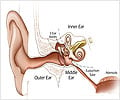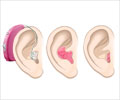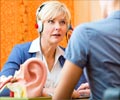Something is going on in the brains of typical older adults that cause them to struggle to follow speech amidst background noise.

‘Older adults have difficulty understanding speech in noise because the timing aspects of the speech signal are not being accurately encoded.’





In an interdisciplinary study, researchers Samira Anderson, Jonathan Z. Simon, and Alessandro Presacco found that adults aged 61-73 with normal hearing scored significantly worse on speech understanding in noisy environments than adults aged 18-30 with normal hearing. The researchers are all associated with the UMD's Brain and Behavior Initiative. "Evidence of degraded representation of speech in noise, in the aging midbrain and cortex" is part of ongoing research into the so-called cocktail party problem, or the brain's ability to focus on and process a particular stream of speech in the middle of a noisy environment. This research brings together the fields of hearing and speech science, neuroscience and cognitive science, electrical engineering, biology, and systems science. The study subjects underwent two different kinds of scans to measure their brains' electrical activity while they listened to people talk.
The researchers were able to see what the subjects' brains were up to when asked what someone was saying, both in a quiet environment and amidst a level of noise. The researchers studied two areas of the brain. They looked at the more 'ancestral' midbrain area, which most vertebrate animals, all the way down to fish have, and which does basic processing of all sounds. They also looked at the cortex, which is particularly large in humans and part of which specializes in speech processing.
In the younger subject group, the midbrain generated a signal that matched its task in each case, looking like speech in the quiet environment, and speech clearly discernable against a noisy background in the noise environment. But in the older subject group, the quality of the response to the speech signal was degraded even when in the quiet environment, and the response was even worse in the noisy environment.
"For older listeners, even when there isn't any noise, the brain is already having trouble processing the speech," said researcher Simon. Neural signals recorded from cortex showed that younger adults could process speech well in a relatively short amount of time. But the auditory cortex of older test subjects took longer to represent the same amount of information. "Part of the comprehension problems experienced by older adults in both quiet and noise conditions could be linked to age-related imbalance between excitatory and inhibitory neural processes in the brain," researcher Presacco said.
Advertisement
This eroding of brain function appears to be typical for older adults and a natural part of the aging process. The researchers are now looking into whether brain training techniques may be able to help older adults improve their speech comprehension. Simple courtesies can help, too. Since being able to see as well as hear someone speaking helps with speech processing, it's a good idea to look directly at older adults and make sure you have their attention before talking with them. "The older brain just drops part of the speech signal, even if the ears captured it all just fine," said Simon.
Advertisement
"Because they have normal hearing, talking louder does not help. So if someone is having trouble understanding you in a noisy restaurant or in a crowded room, it is most important to speak clearly at a normal or slightly slower than normal rate. Your older loved ones will appreciate this courtesy during the upcoming holidays!" The study has been published in Journal of Neurophysiology.
Source-ANI









